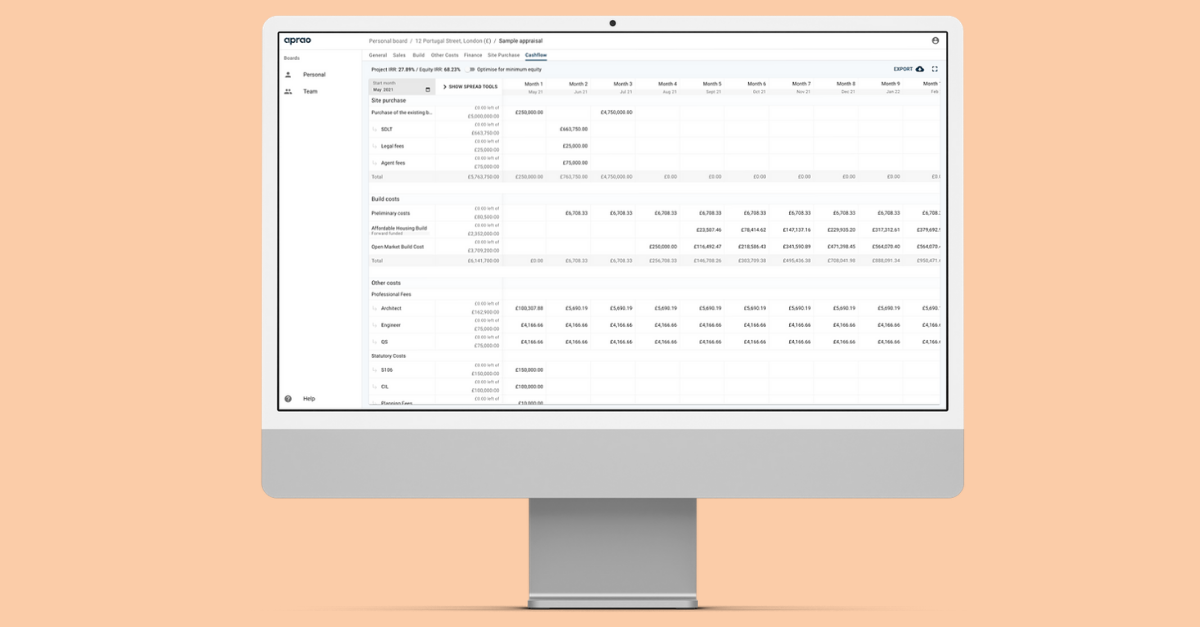Once upon a time, property developers turned to the back of envelopes to create development feasibilities, and accountants got out their trusty calculators! Then Excel came along, promising to make processes easier and save people time – no more paper or calculators. That was great for the mid-2000s, but times change, and Excel is quickly becoming yesterday's news. Cloud-based solutions are the now and the future, which is why we've put together five reasons for reconsidering your excel spreadsheet for development feasibility.
1. Cloud-based options save timeExcel saves plenty of time when compared to manual processes. But the landscape changes, and what was once seen as a speedy alternative is now archaic and time-consuming. On the other hand, cloud-based software is designed with ease of use and transparency in mind.
Since switching from Excel to Aprao, clients have saved 80% of their time on development feasibilities. Features like feasibility reports, automated cash flow, and sensitivity analysis offer a layer of depth an Excel sheet can't replicate.
Yet many people still use Excel because it's a habit, and habits are hard to break. But moving to a cloud-based solution like Aprao cuts down on the length of time it takes to make feasibilites, speeding up the entire project in the process.
2. Fewer errors
Research has found that a whopping 88% of spreadsheets contain errors. Different formatting and interpretations for how Excel should be used often lead to inconsistencies and, in the worst-case scenario, errors.
It means that a large amount of time is reserved for checking mistakes. A 2013 Forbes article suggests that Excel could be the most dangerous software on the planet because one mistake could cause a significant chain reaction. That’s still relevant today in 2022, if not more so.
Of course, any software can be misused, and it often comes down to the person behind the numbers. But cloud-based solutions designed specifically for their industry are far more likely to offer robust results. They're also easier to use, which reduces the possibility of human error.
3. A bespoke solution
Excel is a jack of all trades in some senses. You can use it for just about everything, no matter the industry you find yourself working in. That's great for basic solutions, but if you're in the business of feasbilities for property development, you want a bespoke option created for your needs.
The finance sector got Xero, salespeople use CRMs and lead management tools and customer service got chatbots. With Aprao, professionals get a tool designed especially for valuing land. Chartered surveyors, developers, lenders, finance consultants, and even architects all do their own form of feasibilities, and software like Aprao offers a layer of depth that Excel just can't compete with as well as the ability to make your project board bespoke to your individual needs. It also gives you more accuracy for decision-making.
Proptech continues to make strides in real estate, and now anyone needing financial reporting has custom-made tools at their disposal for better feasibilities.
4. Softer learning curves
If you're looking for an incredibly comprehensive tool, then Excel is the answer. However, it's also complex, and many users need professional training to get the most out of the features and maximise Excel's capabilities. This is a major disadvantage because training takes time.
Yet, most of this training doesn't happen because it's expensive and time-consuming to provide for team members. Businesses don't often want to spend the resources required to turn their team into Excel whizzes, especially when it only forms a specific part of their role.
Cloud-based software also has some learning requirements, but they're nowhere near the level of Excel. Most teams can be up and running while feeling comfortable with the software within a couple of hours. These solutions are designed with ease of use and manage to be more in-depth to their specific niche without being anywhere near as complex as an Excel spreadsheet.
5. Always evolving
Some companies have built their setups around the use of Excel, but cloud-based technology can certainly do one thing the Microsoft software can't: evolve seamlessly. Cloud-based tech updates all the time to meet the ever-changing demands of its users, whether it's rooted in accounting, property feasibility or lead generation.
As technology evolves, so too do people's expectations. They want quick results with minimum disturbance. We live in the on-demand economy, where users expect high-quality food from a gourmet restaurant delivered to their door, the latest Hollywood blockbuster on their remote control and access to their finances in seconds.
It's no different in the professional world, and while Excel can still do the job, it's not designed for the current landscape, which changes at the drop of a hat. As we move to a new wave of innovation, Excel is likely to be left in the background. What was once a cutting-edge solution has become today's version of the back of a piece of paper.
Aprao is designed to make the development feasibility process more efficient and collaborative. Click below to get started free with Aprao, no credit card required.







Leave a comment